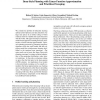13 search results - page 1 / 3 » Tracking value function dynamics to improve reinforcement le... |
ICML
2007
IEEE
14 years 5 months ago
2007
IEEE
Reinforcement learning algorithms can become unstable when combined with linear function approximation. Algorithms that minimize the mean-square Bellman error are guaranteed to co...
ICML
2006
IEEE
2006
IEEE
Automatic basis function construction for approximate dynamic programming and reinforcement learning
13 years 10 months ago
We address the problem of automatically constructing basis functions for linear approximation of the value function of a Markov Decision Process (MDP). Our work builds on results ...
ATAL
2005
Springer
13 years 10 months ago
2005
Springer
Reinforcement learning problems are commonly tackled with temporal difference methods, which use dynamic programming and statistical sampling to estimate the long-term value of ta...
UAI
2008
13 years 5 months ago
2008
We consider the problem of efficiently learning optimal control policies and value functions over large state spaces in an online setting in which estimates must be available afte...
CDC
2010
IEEE
12 years 11 months ago
2010
IEEE
Abstract-- We consider reinforcement learning, and in particular, the Q-learning algorithm in large state and action spaces. In order to cope with the size of the spaces, a functio...

